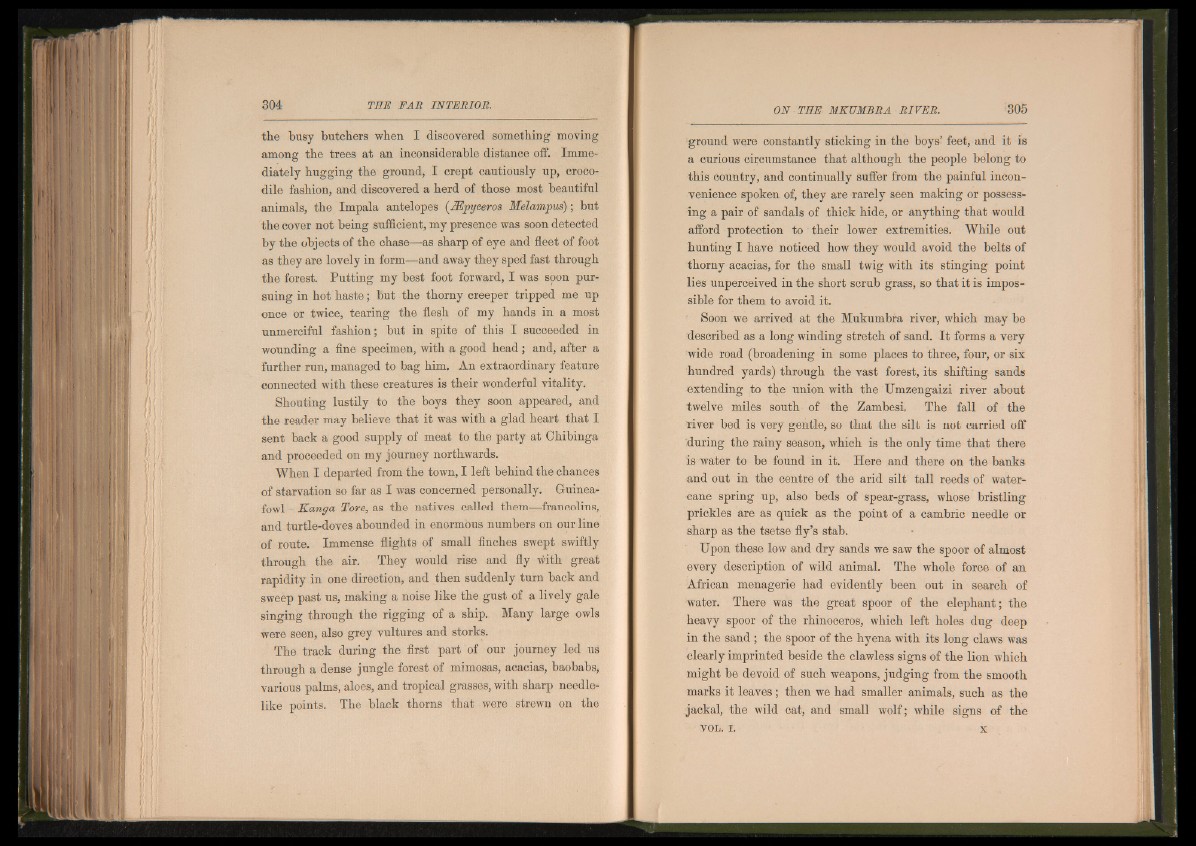
the busy butchers when I discovered something moving
amone the trees at an inconsiderable distance off. Imme-
diately hugging the ground, I crept cautiously up, crocodile
fashion, and discovered a herd of those most beautiful
animals, the Impala antelopes (Mpyceros Melampus); but
the cover not being sufficient, my presence was soon detected
by the objects of the chase—as sharp of eye and fleet of foot
as they are lovely in form—and away they sped fast through
the forest. Putting my best foot forward, I was soon pursuing
in hot haste; but the thorny creeper tripped me up
once or twice, tearing the flesh of my hands in a most
unmerciful fashion; but in spite of this I succeeded in
wounding a fine specimen, with a good head; and, after a
further run, managed to bag him. An extraordinary feature
connected with these creatures is their wonderful vitality.
Shouting lustily to the boys they soon appeared, and
the reader may believe that it was with a glad heart that I
sent back a good supply of meat to the party at Chibinga
and proceeded on my journey northwards.
When I departed from the town, I left behind the chances
of starvation so far as I was concerned personally. Guinea-
fowl—Kanga Tore, as the natives called them-—francolins,
and turtle-doves abounded in enormous numbers on our line
of route. Immense flights of small finches swept swiftly
through the air. They would rise and fly with great
rapidity in one direction, and then suddenly turn back and
sweep past us, making a noise like the gust of a lively gale
singing through the rigging of a ship. Many large owls
were seen, also grey vultures and storks.
The track during the first part of our journey led us
through a dense jungle forest of mimosas, acacias, baobabs,
various palms, aloes, and tropical grasses, with sharp needlelike
points. The black thorns that were strewn on the
ground were constantly sticking in the boys’ feet, and it is
a curious circumstance that although the people belong to
this country, and continually suffer from the painful inconvenience
spoken of, they are rarely seen making or possessing
a pair of sandals of thick hide, or anything that would
afford protection to their lower extremities. While out
hunting I have noticed how they would avoid the belts of
thorny acacias, for the small twig with its stinging point
lies unperceived in the short scrub grass, so that it is impossible
for them to avoid it.
Soon we arrived at the Mukumbra river, which may be
described as a long winding stretch of sand. I t forms a very
wide road (broadening in some places to three, four, or six
hundred yards) through the vast forest, its shifting sands
extending to the union with the Umzengaizi river about
twelve miles south of the Zambesi, The fall of the
river bed is very gentle, so that the silt is not carried off
during the rainy season, which is the only time that there
is water to be found in it. Here and there on the banks
and out in the centre of the arid silt tall reeds of water-
cane spring up, also beds of spear-grass, whose bristling
prickles are as quick as the point of a cambric needle or
sharp as the tsetse fly’s stab.
Upon these low and dry sands we saw the spoor of almost
every description of wild animal. The whole force of an
African menagerie had evidently been out in search of
water. There was the great spoor of the elephant; the
heavy spoor of the rhinoceros, which left holes dug deep
in the sand ; the spoor of the hyena with its long claws was
clearly imprinted beside the clawless signs of the lion which
might be devoid of such weapons, judging from the smooth
marks it leaves ; then we had smaller animals, such as the
jackal, the wild cat, and small wolf; while signs of the
v o l . i. x